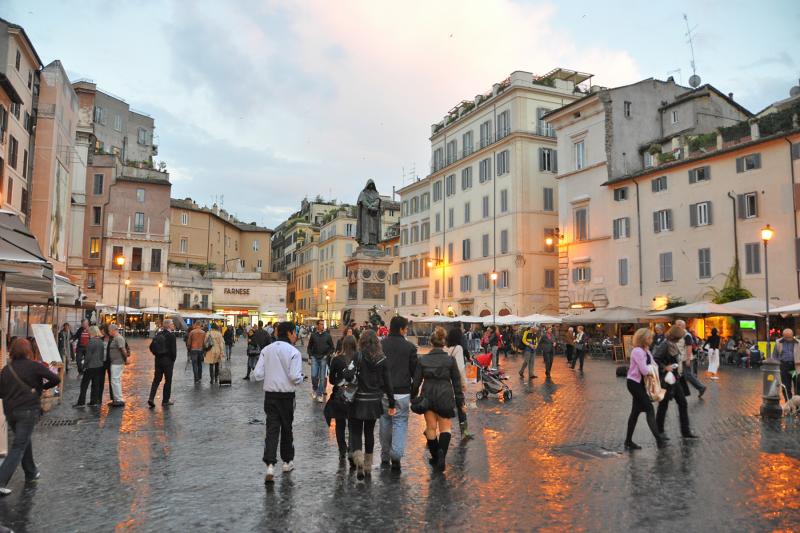Rick Steves’ Europe: A romantic breeze in Rome
Appears in the Online Edition, July 2021.
As we’ve had to postpone our travels because of the pandemic, I believe a weekly dose of travel dreaming can be good medicine. Here’s one of my favorite European memories from Rome — a reminder of the enchanting Italian ambiance that awaits us at the other end of this crisis.
A statue of Giordano Bruno marks the center of Campo de’ Fiori — my favorite square in Rome. Five centuries ago, Bruno challenged the Roman Church and was burned at the stake right here. With each visit, I make a quiet little pilgrimage, staring into the eyes of brooding Bruno, pondering the courage of those early heretics.
When in Rome, I use Bruno as a meeting point. (I like to say, “I’ll be sitting under Bruno.”) Tonight, I’m waiting for my Roman friends Stefano and Paola. With each visit, they take me on a quest for restaurants to recommend in my guidebook. They’ve promised to take me to a little restaurant they deem perfect. When they arrive, I say ciao to Bruno and we walk down a narrow cobbled lane to a classic, crumpled little piazza filled with scooters. On the far side, a single eatery is all lit up. The sign above the door says “Filetti di Baccalà.”
“Stefano, you’re right. This is perfect.” I walk ahead, navigating the gridlock of abandoned scooters to get into the restaurant. A long line of tables, covered with white-paper tablecloths and crowded with locals, stretches to a neon-lit kitchen in the back. And there, two grease-splattered cooks are busy cranking out filetti di baccalà ... Rome’s answer to fish sticks.
There’s one table open near the back, past an old man in a black suit playing the violin. We limbo by the violinist and grab it. Above our table a weathered sign reads Specialità Filetti di Baccalà 60 lire. The price has been revised over the years in response to the whims of the economy, peaking at 4,000 lire. Today, it’s 5 euros. The harried waiter drops off a simple menu, listing a humble selection of appetizers and salads, but only one main course (filetti di baccalà) and, with his thumb hitchhiking into his mouth, asks, “Da bere?” (“To drink?”).
Our fillet of cod is about what you’d expect at a top-notch London fish-and-chips joint. We enjoy it along with some breaded and fried zucchini, a salad of greens I’d never before encountered, and a carafe of white wine. Some people might think the meal is nothing special. But buried deep in the medieval center of the city, in a tarnished and varnished eatery without a tourist in sight, the ambience is intoxicating.
The violinist plays Sinatra’s “My Way” to an appreciative crowd. Eventually he makes his way to our table, standing just beyond Paola’s radiant face. It’s a classic Roman moment. Her dark eyes, framed by little black glasses, are locked on Stefano’s. Tiny rings of pearls set in gold swing from her ears. A gold necklace is the perfect complement to her smooth, olive complexion.
Like a hungry camera, my eyes compose the scene: carafe of golden white wine shimmering in the foreground, Paola’s face looking lovingly at her husband in the middle, and the violinist — jaw tight on his instrument but still smiling — in the back. The happy chatter of dinner conversation rounds out the tableau.
As if only for Paola, the musician plays a Roman anthem to the night. Paola whispers to me, “This is Ponentino ... a special wind, a sweet ... ” brushing her hand gently along her cheek in search of the word, “ ... caressing Roman wind.”
Then she and Stefano face the music, and with the entire room, sing the song:
Rome, don’t be foolish tonight.
Give me the sweet wind to let her say yes.
Turn on all the stars that you have ... the brightest ones.
Give me a small flash of the moon, only for us.
Let her feel that springtime is arriving.
Give me your very best crickets to sing to her.
Give me the Ponentino.
Be a partner with me.
Paola translates for me. In verse two, the woman answers: “Rome, give me a helping hand to tell him no,” and so on. But, in the final verse, of course, they get together, creating the love triangle: a man, a woman ... and Rome.
With the room still singing, the elegant older couple at the next table look over at us. Seeming pleased that the three of us — a generation behind hers — are enjoying this traditional Roman moment, the woman says, “Bella.”
(Rick Steves (www.ricksteves.com) writes European guidebooks, hosts travel shows on public TV and radio, and organizes European tours. This article was adapted from his new book, For the Love of Europe. You can email Rick at rick@ricksteves.com and follow his blog on Facebook.)

